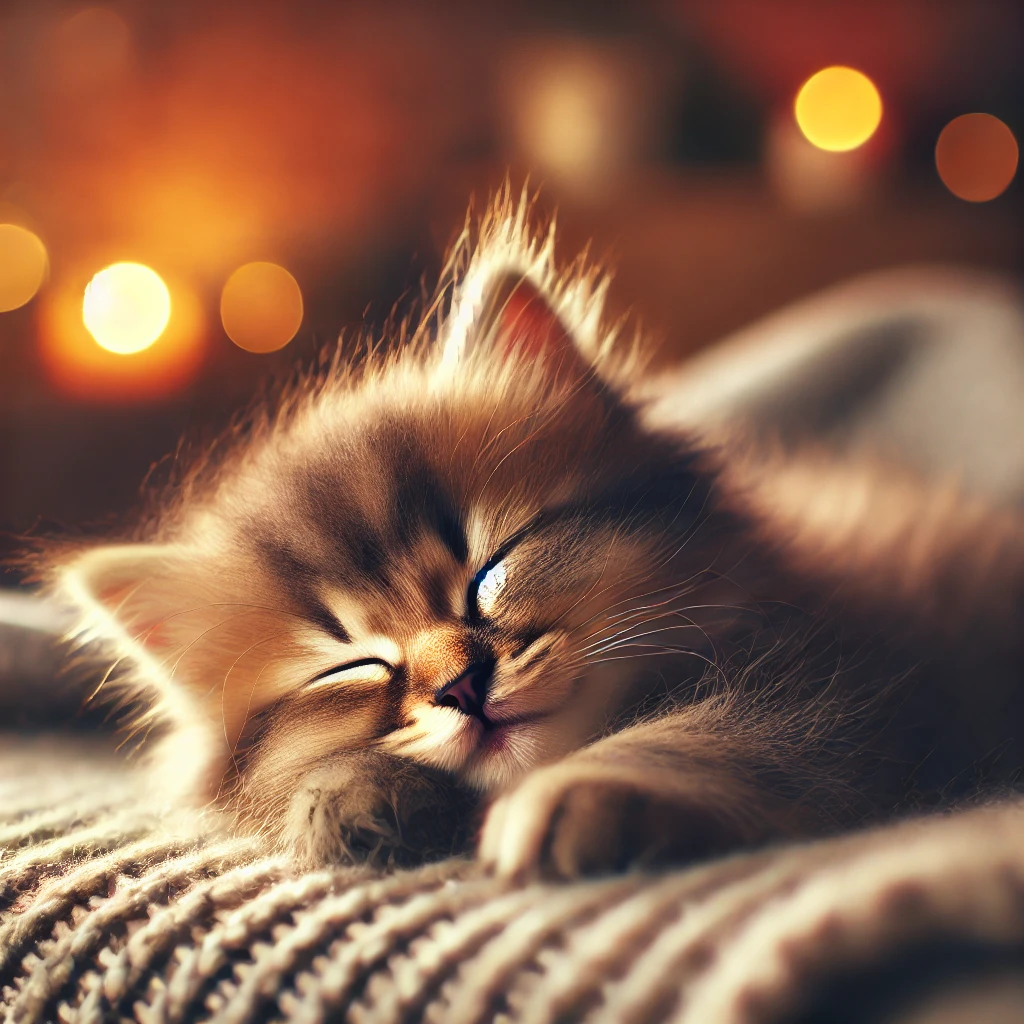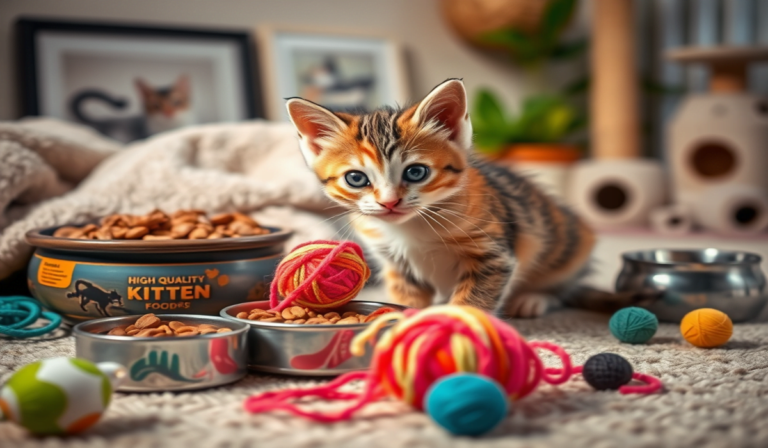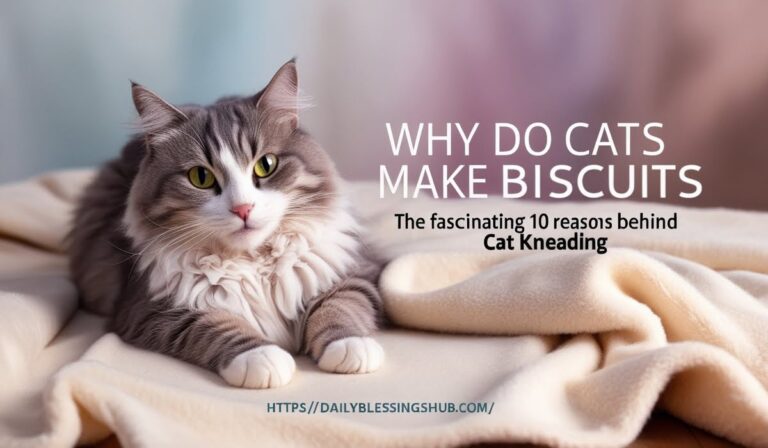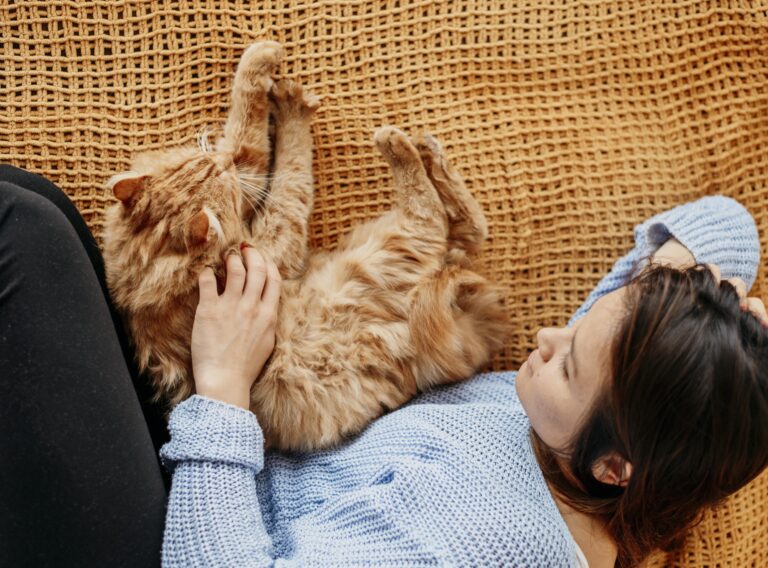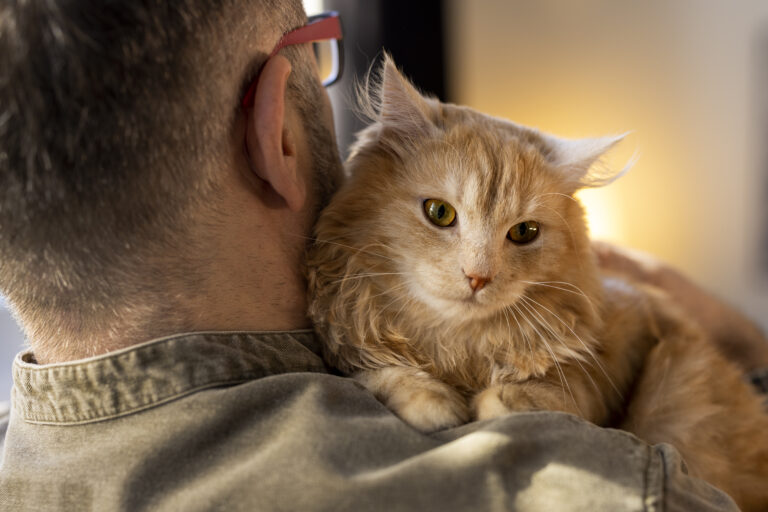Why Is My Kitten Purring So Much?
Table of Contents
Purring is one of the most recognizable and comforting sounds a kitten can make. But if your kitten is purring constantly, you might wonder, “Why is my kitten purring so much?” While purring is generally seen as a sign of contentment, there’s more to this behavior than meets the eye. Understanding your kitten’s behaviors, including purring, can help you connect with your feline friend on a deeper level.
Understanding Your Kitten’s Behaviors
Kittens, much like adult cats, exhibit a wide range of behaviors that can be puzzling to new owners. One such behavior is purring. You might notice that your new kitten is constantly purring, whether it’s while they’re playing, eating, or even sleeping. But why does this happen?
Purring is an innate behavior that kittens learn from birth. It starts as a form of communication with their mother, who will purr back to them. This communication fosters a sense of security and bonding. However, as kittens grow older, they start to purr for various reasons. Some of these reasons can be quite surprising.
Why Does My Kitten Purr Constantly?
If your kitten purrs non-stop, it’s important to understand that purring is not always a simple sign of happiness. Here are several reasons why your kitten might be purring constantly:
- Contentment and Comfort: The most common reason a kitten purrs is because they are content. If your kitten is purring while you pet them or when they’re snuggled up next to you, it’s likely because they feel safe and comfortable.
- Seeking Attention: Kittens learn early on that purring can get them the attention they crave. If your kitten is purring constantly, they may be trying to get you to notice them.
- Healing and Relaxation: Purring has been shown to have a calming effect on cats. It’s believed that the vibrations from purring can help with pain relief and healing, which is why a kitten might purr when they’re feeling unwell.
- Stress or Anxiety: On the flip side, purring can also be a self-soothing behavior when a kitten is stressed or anxious. If your kitten is in an unfamiliar environment or experiencing a lot of changes, they may purr as a way to calm themselves.
- Hunger: Sometimes, a kitten will purr when they’re hungry, especially when they’re trying to get your attention to feed them. This is often accompanied by kneading, another behavior that harks back to kittenhood.
10 Reasons for Why Your Cat Is Purring
Purring can be a complex behavior, with different meanings depending on the situation. Here are 10 reasons why your cat might be purring:
- Happiness and Contentment: As mentioned earlier, the most common reason.
- Seeking Attention: Your kitten might purr to get your attention.
- Comfort: They may purr when they are in a comfortable environment.
- Healing: Purring can promote self-healing.
- Stress Relief: Purring can soothe anxiety.
- Bonding: Cats purr when they are bonding with other cats or humans.
- Hunger: Kittens often purr when they want food.
- Mother-Kitten Communication: Purring is one of the first sounds a kitten makes to communicate with its mother.
- Relaxation: Purring can indicate that your kitten is relaxing after play or exercise.
- Illness or Pain: Sometimes, purring is a way for kittens to comfort themselves when they’re in pain.
What Does It Mean When a Kitten Purrs?
When a kitten purrs, it’s a form of communication. But what exactly are they trying to say? The meaning behind the purring can vary depending on the context:
- Purring While Eating: If your kitten is purring while eating, it likely means they’re enjoying their meal and feel safe in their environment.
- Purring While Sleeping: Purring in their sleep is a sign that your kitten is comfortable and at peace. It can also be a way for them to soothe themselves into a deeper sleep.
- Purring While Playing: When your kitten purrs while playing, it indicates that they are happy and enjoying themselves.
- Purring During Petting: If your kitten purrs when you pet them, they’re probably enjoying the attention and affection.
Kitten Purring and Its Effect on Humans
Kitten purring doesn’t just affect the kitten; it can also impact humans. The sound of a purring is often associated with feelings of calm and relaxation in people. Studies have shown that listening to a cat purr can lower stress levels and even reduce blood pressure.
Moreover, the frequency of a kitten’s purr, which ranges from 25 to 150 Hertz, is thought to promote healing in humans. This frequency can help reduce pain and inflammation, making the kitten’s purring a therapeutic sound for their owners.
6 Things Your Cat Is Trying to Tell You by Purring
- “I’m Happy” – The classic reason for purring.
- “I’m Relaxed” – Purring often means your kitten is relaxed.
- “I Want Attention” – Purring can be a way to get you to interact with them.
- “I’m Hungry” – If your kitten is purring and meowing at feeding time, they might be telling you they’re ready to eat.
- “I’m Anxious” – Purring can be a way for kittens to calm themselves down.
- “I’m Not Feeling Well” – Sometimes, purring is a response to pain or discomfort.
Why Is My Kitten Purring While Sleeping on Me?
You might notice that your kitten purrs while they’re sleeping on you. This is usually a sign that they feel extremely safe and secure in your presence. Your warmth and scent provide comfort, and the purring is a way for them to express that contentment.
It’s also possible that the rhythmic sound of your heartbeat and breathing helps them relax further.
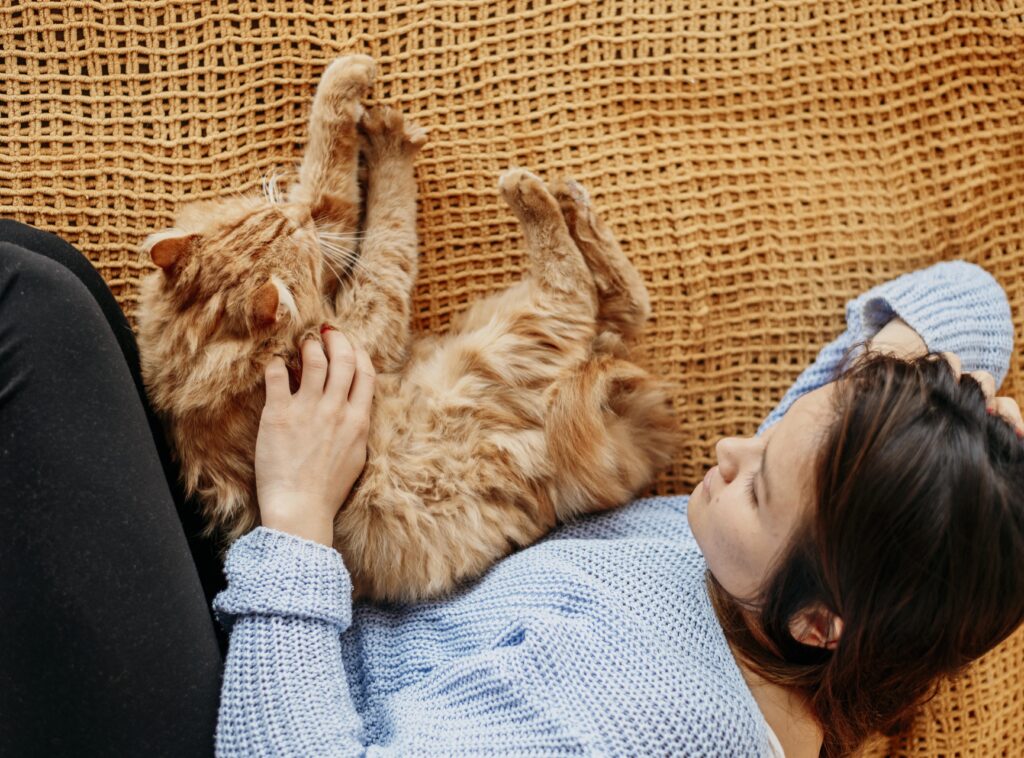
Kitten Purring Behavior: Day vs. Night
It’s not uncommon for kittens to purr more at certain times of the day. If your kitten is purring a lot at night, it might be because nighttime is when they feel most secure. Cats are naturally nocturnal creatures, and purring at night might be a way for them to comfort themselves in the dark. During the day, kittens might purr when they’re in familiar, comfortable environments. At night, however, they might purr more if they’re feeling lonely or anxious, especially if they’re still getting used to their new home.

Why Is My Kitten Purring So Loud?
Some kittens purr louder than others, and this can be due to several factors:
- Personality: Just like people, cats have different personalities. Some kittens are naturally louder purrers than others.
- Health: If your kitten’s purr suddenly becomes louder, it might be worth checking with a vet to make sure they’re not experiencing any health issues.
- Age: Younger kittens often purr more loudly than older cats, as they’re still developing their vocal cords.
- Environment: A quiet environment might make your kitten’s purr sound louder by contrast.
Kitten Purring and Kneading
Another behavior you might notice is your kitten purring while kneading. Kneading is when a kitten presses their paws alternately against a soft surface, like a blanket or your lap. This behavior is often accompanied by purring and is a sign of contentment and comfort.
Kittens knead instinctively; they did this as newborns to stimulate their mother’s milk flow. As they grow older, they continue to knead when they’re feeling safe and relaxed.
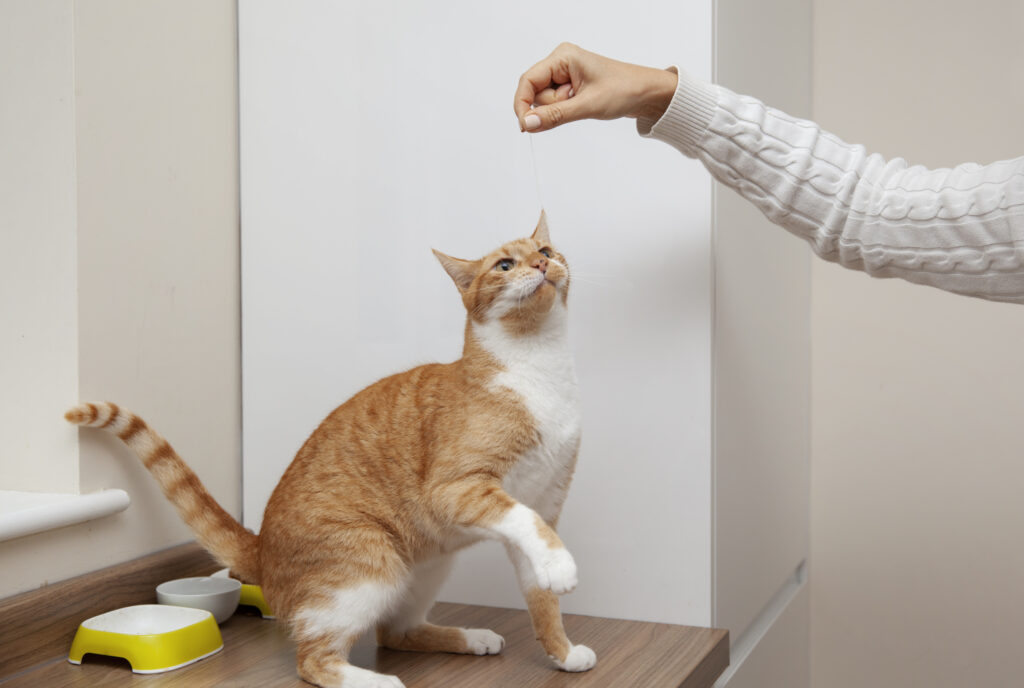
FAQs
What Is Kitten Purring?
Kitten purring is the soft, rhythmic vibration sound made by kittens, typically when they are content or seeking comfort. It originates from the rapid movement of their laryngeal muscles and their diaphragm.
Why Do Kittens Purr?
Kittens purr for several reasons, including contentment, communication with their mother, or even as a self-soothing mechanism when they feel stressed or unwell.
When Do Kittens Start Purring?
Kittens typically begin purring within the first few days after birth. It helps them bond with their mother and communicate their needs, such as when they are hungry or content.
Is Purring Always a Sign of Happiness?
No, purring is not always a sign of happiness. While it often indicates contentment, kittens may also purr when they are scared, in pain, or trying to calm themselves.
How Can You Tell If a Kitten Is Purring?
You can tell a kitten is purring by placing your hand gently on its throat or chest to feel the vibrations, or by listening closely for the soft, repetitive sound.
Do All Kittens Purr the Same Way?
No, the sound and intensity of purring can vary between kittens. Some purr loudly, while others have a softer or more subtle purr.
Why Do Kittens Purr While Nursing?
Kittens purr while nursing to communicate contentment and to bond with their mother. It’s also a way for the mother to know they are safe and well-fed.
Can Kittens Purr When They Are Stressed?
Yes, kittens can purr when they are stressed or scared. Purring can act as a self-soothing mechanism to help them feel more secure.
Why Do Kittens Purr When Sleeping?
Kittens often purr when sleeping because they feel relaxed and comfortable. It indicates that they are in a safe and peaceful environment.
Is It Normal for a Kitten Not to Purr?
Yes, some kittens may not purr as frequently or at all. This could be due to individual differences or their way of expressing themselves.
Can Loud Noises Affect a Kitten’s Purring?
Yes, loud noises can affect a kitten’s purring. They may stop purring if they feel startled or stressed by sudden or loud sounds.
Why Does My Kitten Purr When I Pet It?
Your kitten purrs when you pet it as a sign of affection and comfort. It shows that they enjoy the interaction and feel at ease with you.
Is Purring Linked to a Kitten’s Health?
Yes, purring can sometimes be linked to a kitten’s health. While it often indicates contentment, excessive or unusual purring could signal discomfort or pain.
Can Humans Imitate Purring to Comfort Kittens?
Humans can try to imitate purring sounds, which might help comfort kittens. However, physical closeness and gentle stroking are often more effective.
Why Does My Kitten Purr and Knead Simultaneously?
When kittens purr and knead simultaneously, it usually indicates contentment and comfort. It mimics the behavior they displayed while nursing.
Do Kittens Purr Around Other Animals?
Yes, kittens may purr around other animals if they feel safe and comfortable. It can also be a way of communicating trust or submission.
Why Does My Kitten Purr During Vet Visits?
Kittens may purr during vet visits to self-soothe and cope with stress or fear. It doesn’t always mean they are relaxed or happy.
Can Purring Help Kittens Heal?
Purring may help kittens heal by releasing endorphins and promoting relaxation. Some studies suggest that the vibrations from purring can aid in tissue regeneration and pain relief.
Do Mother Cats Purr to Their Kittens?
Yes, mother cats often purr to communicate with their kittens and create a comforting environment. It helps establish a bond and reassures the kittens.
Can Excessive Purring Be a Cause for Concern?
Excessive purring can sometimes indicate a problem, such as pain, stress, or illness. If your kitten’s purring seems unusual or is accompanied by other symptoms, consult a veterinarian.

